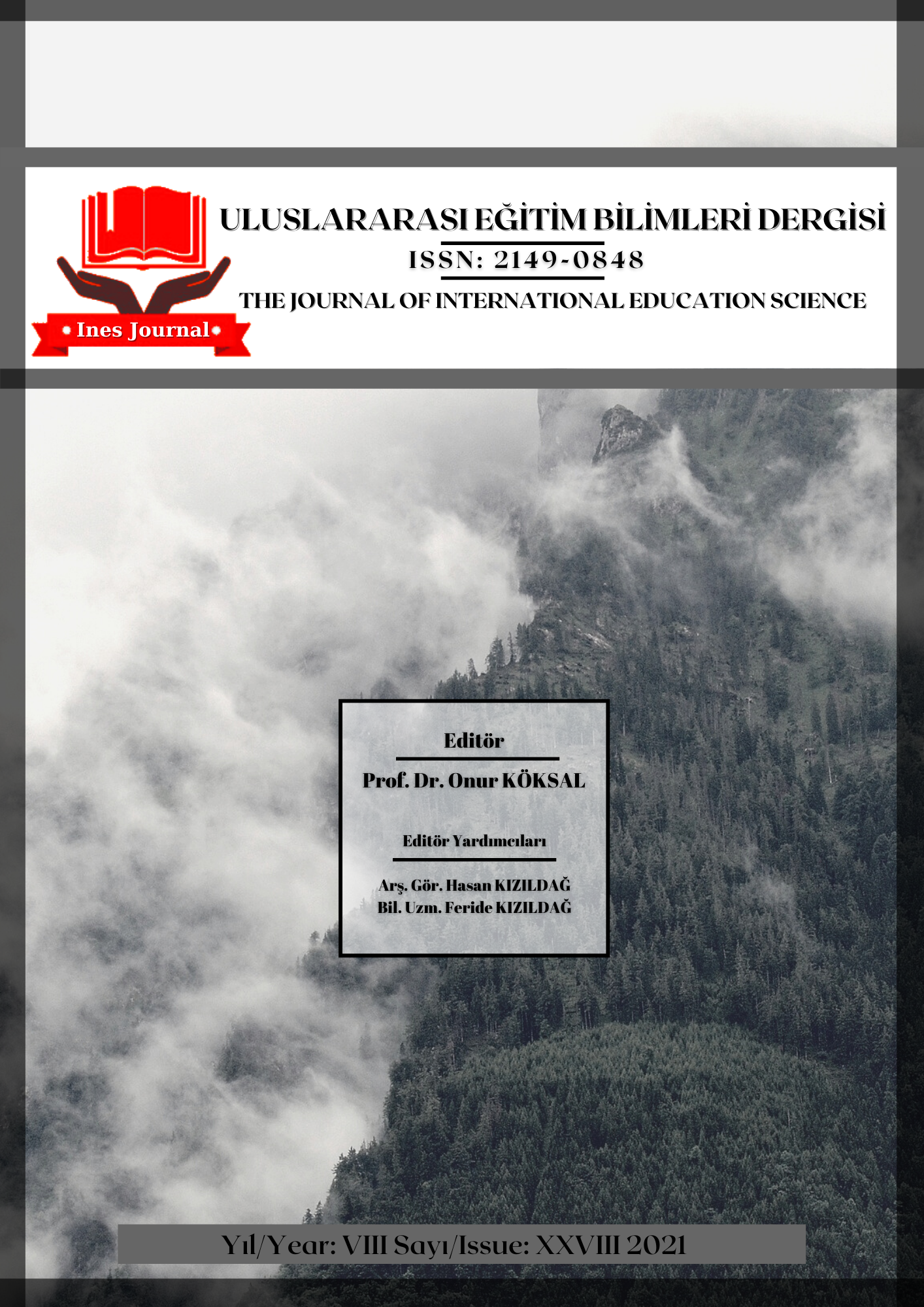Author :
Abstract
Dünya günümüzde bir bilgi toplumu haline gelmiştir ve toplumumuzdaki her bir birey için bilgiye nasıl ulaşacağı, bir araştırmanın nasıl yapılacağı, nasıl bir yol izleneceği ve araştırmalar sonuncunda elde edilen veri ve çıkarımların diğer kişilerle paylaşımı konusu toplumdaki bireylerin ilgisini gitikçe çekmeye başlamıştır. Bu açıdan ele alındığında bilgi okuryazarlığı eğitim alanındaki önemli hususlardan biridir ve konunun popularitesi gün geçtikçe de giderek artmaktadır. Bu bağlamda etkin bir dil öğretim ve öğrenim faaliyetlerinde gündem bilgiye nasıl ulaşılacağı ve bu bilgiye ulaşmada gerekli olan bilgi ve becerileri elde etmek üzerine yoğunlaşmaktadır. Genel anlamda bilgi okuryazarlığı moderleşme yolunda ilerleyen toplumlardaki bireyleri aydınlatmak amacı ile gerekli olan bilgiye sahip olma durumunu ifade etmeyi içine almaktadır. Bilginin her yere ulaştırılması internet vasıtasıyla daha da kolay bir hale gelmiştir. Bunun paralelinde bilgiye ulaşma giderek daha kolay hale gelmekte ve bilginin kalitesi de gittikçe daha da artmaktadır. Bununla birlikte bilgi okuyazarlığı faaliyetleri birtakım önemli unsurları içine almaktadır. Bunlar, eğitimde etkin bir bilgi okuyazarlığı becerileri elde etmek, ve gerekli iletişim becerilerinin geliştirilmesidir. Çalışmada bilgi okuyazarlığı kavramı dil öğretimi kapsamındaher açıdan incelenmiş, ilgili literatür incelemesi yapılarak konunun aydınlatılması hedeflenmiştir.
Keywords
Abstract
The world today is a knowledge community and it is clear for everyone that every individual is interested in how to get information and how to conduct a research, share or communicate the research results for furtherance of knowledge. With this regard information literacy is a very significant issue in the educational area, ant it is getting popular all the more. One of the most crucial perceptions that is needed in the course of effective learning and teaching activities is to include skills in order to get information from the related sources. Information literacy comprises obtaining the necessary bits of knowledge which are needed for the aim of acting as an enlightened people in a modern community. The process of democratizing the distribution of information that has occurred since the advent of the internet, it is also true that the quality of the information is developed all the more. The process of developing informational literacy involves a number of important factors. Among these are the cultivation of effective literacy skills in the primary areas of education, and the development of essential communication skills. In the study the concepts concerning Information literacy are expounded and it is aimed to shed light on the issue within the scope of related literature.
Keywords
- Akkoyunlu, B., & Korkut, E. (2008). Yabancı Dil Öğretmen Adaylarının Bilgi Ve Bilgisayar Okuryazarlık Öz-Yeterlikleri. Hacettepe Üniversitesi Eğitim Fakültesi Dergisi, 34(34), 178-188.
- Aydın, F. (2010). Ortaöğretim Öğrencilerinin Coğrafya Dersinde Güdülenmelerine Olum- suz Etki Eden Faktörlere İlişkin Görüşleri. Balıkesir Üniversitesi Sosyal Bilimler Enstitüsü Dergisi, 13(24), 31-43.
- Barner, R. (1996). Seven changes that will challenge managers-and workers. The Futurist, 30 (2), 14–18.
- Breivik P. S., and Senn J. A. (1998). Information literacy: Educating children for the 21st century. (2nd ed.). Washington, DC: National Education Association.
- Cambridge online Dictionary (2021). Retrieved on February 9, 2021, at https://dictionary.cambridge.org/dictionary/ english/literacy
- Eisenberg, M. L., Carrie A., & Spitzer, K. (2004). Information Literacy: Essential Skills for the Information Age. 2nd. edition. Libraries Unlimited.
- Ercegovac, Z. (2008). Information literacy: Search strategies, tools & resources for high school students and college freshmen. (2nd ed.). Columbus, OH: Linworth Books.
- Ercegovac, Z. (2012). Letting students use Web 2.0 tools to hook one another on reading. Knowledge Quest, 40 (3), 36-39.
- Glasser, W. (1996). The Quality School: Managing Students Without Coercion. New York: Har- per Collins.
- Grassian, Esther. (2004). Information Literacy: Building on Bibliographic Instruction. Ame- rican Libraries, 35 (9), 51–53.
- Kavuncu, E. (2001). Özel ilköğretim okul kütüphanelerinde kullanıcı eğitim programlarının geliştirilmesi. Yayımlanmamış Bilim Uzmanlığı tezi. Hacettepe Üniversitesi, Ankara.
- Kurbanoğlu, S., & Akkoyunlu, B. (2004). Öğretmenlerin Bilgi Okuryazarlığı ÖzYeterlik İnancı Üzerine Bir Çalışma. Hacettepe Üniversitesi Eğitim Fakültesi Dergisi, 27, 11-20.
- Landøy, A., Popa, D., and Repanovici, A. (2020). Basic Concepts in Information Lite- racy. In: Collaboration in Designing a Pedagogical Approach in Information Literacy . Springer Texts in Education. Springer, Cham.
- Marginson, S. (1999). After globalization: emerging politics of education, Journal of Educa- tion Policy, 14(1), pp. 19-31.
- Obama, B. (2009). Presidential Proclamation: National Information Literacy Awareness Month, 2009. Washington, DC: U.S. Government Printing Office.
- Osborne, R. (Ed.). (2004). From outreach to equity: Innovative models of library policy and practi- ce. Chicago: American Library Association.
- Rizvi, F. (2007). Postcolonialism and Globalization in Education. Cultural Studies, Critical Methodologies, 7(3), 256-263.
- Ryan, J., and Capra, S. (2001). Information literacy toolkit. Chicago: American Library Asso- ciation. Schwarzenegger, S. (2009). Executive order S-06-09. Sacramento, CA.
- Tosuncuoğlu, I., and Küçükler, H. (2019). The Perceptions of Information Literacy by Stu- dents in English Language Departments: A Comparative Study. World Journal of Education, 9(1), 125-134., Doi: doi:10.5430/wje.v9n1p125.
- UNESCO / United Nations Educational, Scientific and Cultural Organisation. (2006). Using ICT to develop literacy. Bangkok: UNESCO
- Usluel, Y. K., Mazman, S. G., & Arıkan, A. (2009). Prospective teachers’ awareness of colla- borative web 2.0 tools. In The IADIS International Conferencewww/Internet 2009, 19-22.
- Wilkinson, Carrol W. (2012). Transforming information literacy programs: Intersecting frontiers of self, library culture, and campus community. Chicago, IL: ACRL Publications in Librarianship.
- Wlodkowski, R. J. (1999). Motivation and Diversity: A Framework for Teaching. New Direc- tions for Teaching and Learning, 78, 7-9.
- Yan-xia, D. (2017). Research on College English Teachers’ Information Literacy inInforma- tion Environment. English Language Teaching, 10(11), 37-43. https://doi.org/10.5539/elt.v10n11p37
- Zurkowski, Paul G. (1974).The information service environment: Relationships and priorities. Washington, DC: National Commission on Libraries and Information Science.
